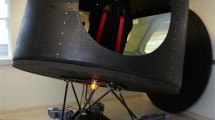Summary
Living in the space environment and exposure to microgravity induce a number of effects that may interfere with human cognitive and psychomotor performance. However, up to now very few attempts have been made to monitor possible impairments of human performance during space missions. In the present single-case study several cognitive and psychomotor functions were monitored during an 8-day space mission to an orbital station using a computerized performance monitoring device. This device included four different tasks, which were selected from a battery of Standardized Tests for Research with Environmental Stressors published recently by the NATO Advisory Group for Aerospace Research and Development, and which demanded logical reasoning and decision-making functions, memory retrieval functions, and fine manual control. Each task was performed 23 times (6 preflight, 13 inflight, 4 post-flight sessions). By means of single-subject statistics inflight performance was compared with baseline performance during pre- and postflight sessions. In accordance with the few previous performance studies conducted during space flights, speed and accuracy of short-term memory retrieval and logical reasoning functions remained unimpaired during the stay in space. However, clear decrements in tracking performance were found, showing to increased difficulties in fine manual control. These results suggest that performance decrements in space may arise primarily in psychomotor functions due to alterations requiring an effortful accommodation of motor skills which had been acquired under 1-g conditions to the new conditions of microgravity.
Similar content being viewed by others
Abbreviations
- GRT:
-
Grammatical Reasoning Task
- MST:
-
Memory Search Task
- RMSE:
-
root-mean-square tracking error
- UTT:
-
Unntable Tracking Task
References
Advisory Group for Aerospace Research and Development (1989) Human performance assessment methods. AGARDograph no. 308, Neuilly-Sur-Seine
Allen RW, Jex HR (1972) Visual-motor response of crewman during a simulated 90-day space mission as measured by the critical task battery. Proceedings of the 7th Annual Conference on Manual Control, NASA SP-281, pp 239–246
Baddeley AD (1968) A 3-minute reasoning test based on grammatical transformations. Psychonom Sci 10:341–342
Batejat D, Lagarde D (1992) Circadian rhythm and sleep deprivation: effects on psychomotor performance. Med Sci Res 20:167–168
Benke T, Koserenko O, Watson NV, Gerstenbrand F (1992) Space and cognition: the measurement of behavioral functions during a six-day space mission. Aviat Space Environ Med 64:376–379
Beringer J (1993) Entwurf einer Anwendersprache zur Steuerung psychologischer Reaktionszeitexperimente. Europäische Hochschulschriften, Series XLI, Informatik. Lang, Frankfurt/Main
Bittner AC, Carter RC, Kennedy RS, Harbeson MM, Krause M (1986) Performance evaluation tests for environmental research (PETER): evaluation of 114 measures. Percept Mot Skills 63:683–708
Christensen JM, Talbot JM (1986) A review of the psychological aspects of space flight. Aviat Space Environ Med 57:203–212
Committee on Space Biology and Medicine, Space Science Board, Commission on Physical Sciences Mathematics and Resources, National Research Council (eds) (1987) A strategy for space biology and medical science, (chap 11). National Academy Press, Washington
Gundel A, Nalishiti V, Reucher E, Vejvoda M, Zulley J (1993) Sleep and circadian rhythm during a short space mission. Clin Investig 71:718–724
Hibbs DA (1974) Problems of statistical estimation and causal inference in time series regression models. In: Costner HA (eds) Sociological methodology 1973–1974. Jossey-Bass, San Francisco, pp 252–308
Jex HR, McDonnell JD, Phatak AV (1966) A “critical” tracking task for manual control research. IEEE Transact Hum Fact Electron 7:138–144
Kanas N (1985) Psychosocial factors affecting simulated and actual space missions. Aviat Space Environ Med 56:806–811
Kanas N (1991) Psychological support for cosmonauts. Aviat Space Environ Med 62:353–355
Kantowitz BH (1992) Selecting measures for human factors research. Hum Fact 34:387–398
Kirk RE (1982) Experimental design, 2nd edn. Brooks/Cole, Belmont
Kozlovskaya IB, Burlachkova NI, Ganchev G, Gatev P, Gerstenbrand F, Berger M (1993) Mechanisms of sensory-motor adaptation to weightlessness. Paper presented to the 10th IAA Man in Space Symposium, Tokyo, April 19–23
Leonov AA, Lebedev VI (1973) Psychological characteristics of the activity of cosmonauts. NASA Technical Translation TT F-727
McCain LJ, McCleary R (1979) The statistical analysis of the simple interrupted time-series quasi-experiment. In: Cook TD, Campbell DT (eds) Quasi-experimentation: design and analysis issues for field settings. Rand McNally College Publishing, Chicago, pp 233–293
Nicogossian AE, Huntoon CL, Pool SL (eds) (1989) Space physiology and medicine, 2nd edn. Lea & Febiger, Philadelphia
Parker PE, Reschke MF, Aldrich NG (1989) Performance. In: Nicogossian AE, Huntoon CL, Pool SL (eds) Space physiology and medicine, 2nd edn. Lea & Febiger, Philadelphia, pp 167–178
Ross HE (1991) Motor skills under varied gravitoinertial force in parabolic flights. Acta Astronautica 23:85–95
Sternberg S (1966) High-speed scanning in human memory. Science 153:652–654
Tada A, Okabe M (1993) Manual control experiment in space. Paper presented to the 10th IAA Man in Space Symposium, Tokyo, Japan, April 22
Taylor AJW (1989) Behavioural science and outer space research. Aviat Space Environ Med 60:815–816
Thornton WE, Moore TP, Pool SL, Vanderploeg J (1987) Clinical characterization and etiology of space motion sickness. Aviat Space Environ Med 58[Suppl 9]:A1-A8
Author information
Authors and Affiliations
Rights and permissions
About this article
Cite this article
Manzey, D., Lorenz, B., Schiewe, A. et al. Behavioral aspects of human adaptation to space analyses of cognitive and psychomotor performance in space during an 8-day space mission. Clin Investig 71, 725–731 (1993). https://doi.org/10.1007/BF00209727
Received:
Revised:
Accepted:
Issue Date:
DOI: https://doi.org/10.1007/BF00209727




